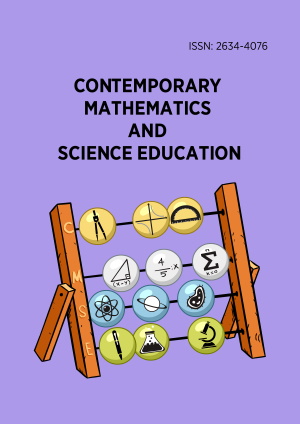Keyword: teaching
20 results found.
Research Article
Contemporary Mathematics and Science Education, 7(1), January 2026, ep26001, https://doi.org/10.30935/conmaths/17739
Research Article
Contemporary Mathematics and Science Education, 6(2), July 2025, ep25016, https://doi.org/10.30935/conmaths/17308
Research Article
Contemporary Mathematics and Science Education, 6(2), July 2025, ep25010, https://doi.org/10.30935/conmaths/16437
Research Article
Contemporary Mathematics and Science Education, 4(2), July 2023, ep23017, https://doi.org/10.30935/conmaths/13252
Research Article
Contemporary Mathematics and Science Education, 4(1), January 2023, ep23015, https://doi.org/10.30935/conmaths/13074
Research Article
Contemporary Mathematics and Science Education, 4(1), January 2023, ep23013, https://doi.org/10.30935/conmaths/13041
Research Article
Contemporary Mathematics and Science Education, 4(1), January 2023, ep23012, https://doi.org/10.30935/conmaths/13029
Research Article
Contemporary Mathematics and Science Education, 4(1), January 2023, ep23011, https://doi.org/10.30935/conmaths/13022
Research Article
Contemporary Mathematics and Science Education, 4(1), January 2023, ep23002, https://doi.org/10.30935/conmaths/12541
Research Article
Contemporary Mathematics and Science Education, 4(1), January 2023, ep23001, https://doi.org/10.30935/conmaths/12540
Research Article
Contemporary Mathematics and Science Education, 3(2), July 2022, ep22018, https://doi.org/10.30935/conmaths/12364
Research Article
Contemporary Mathematics and Science Education, 3(2), July 2022, ep22014, https://doi.org/10.30935/conmaths/12225
Research Article
Contemporary Mathematics and Science Education, 3(2), July 2022, ep22013, https://doi.org/10.30935/conmaths/12112
Research Article
Contemporary Mathematics and Science Education, 3(1), January 2022, ep22010, https://doi.org/10.30935/conmaths/11929
Research Article
Contemporary Mathematics and Science Education, 3(1), January 2022, ep22007, https://doi.org/10.30935/conmaths/11816
Research Article
Contemporary Mathematics and Science Education, 3(1), January 2022, ep22006, https://doi.org/10.30935/conmaths/11815
Research Article
Contemporary Mathematics and Science Education, 2(2), July 2021, ep21010, https://doi.org/10.30935/conmaths/10944
Research Article
Contemporary Mathematics and Science Education, 2(1), January 2021, ep21009, https://doi.org/10.30935/conmaths/10788
Research Article
Contemporary Mathematics and Science Education, 2(1), January 2021, ep21004, https://doi.org/10.30935/conmaths/9679
Research Article
Contemporary Mathematics and Science Education, 1(1), January 2020, ep20001, https://doi.org/10.30935/conmaths/8431

 The articles published in this journal are licensed under the CC-BY Creative Commons Attribution International License.
The articles published in this journal are licensed under the CC-BY Creative Commons Attribution International License.